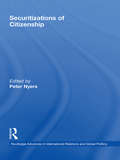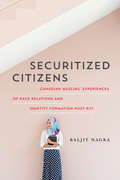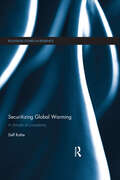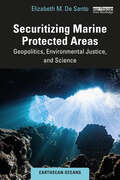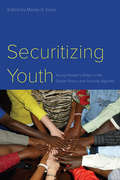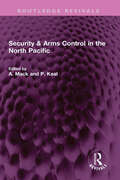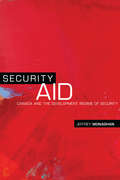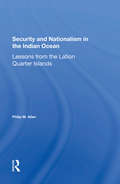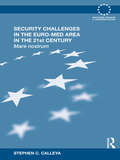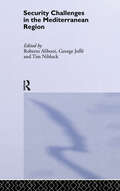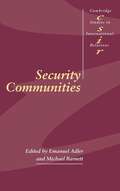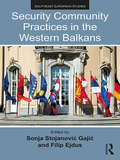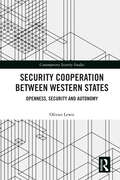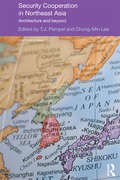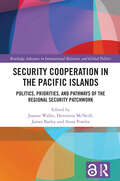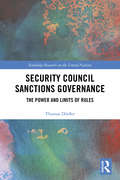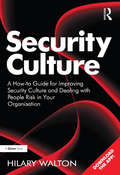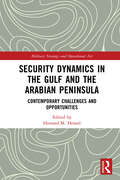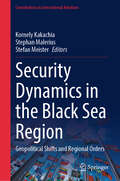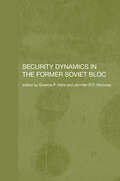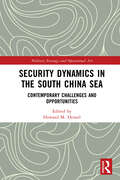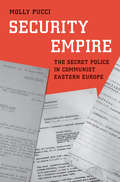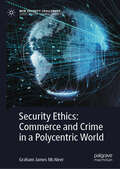- Table View
- List View
Securitizations of Citizenship (Routledge Advances in International Relations and Global Politics)
by Peter NyersSecuritizations of Citizenship investigates how the fate of citizenship is now caught up in a dramatic and dangerous process of securitizing political communities. In the nervous state of affairs of the post-9/11 period, technologies of surveillance and control are rapidly proliferating, creating severe constraints for the enactment of citizenship practices. While citizenship has always faced the problem of exclusiveness, the contemporary relationship between security, territory, and population is being transformed in ways that are creating new dynamics of exclusion for citizens, non-citizens, and quasi-citizens alike. This book assesses a variety of citizenship practices in relation to the emergence of forms of governance that are responsive to – and constitutive of – fears, anxieties, and insecurities in the population. At the same time, the book identifies and assesses citizenship practices for how they can mobilize progressive forces to militate against the nervous, anxious and fearful subjectivities instigated by newly securitized sovereignties. In the critical spaces between inclusion and exclusion, migration and mobility, security and surveillance, reason and neurosis, biopower and sovereign power, the contributors to this book reflect upon the possibilities and constraints for refiguring citizenship today.
Securitized Citizens: Canadian Muslims’ Experiences of Race Relations and Identity Formation Post–9/11
by Baljit NagraUninformed and reactionary responses in the years following the events of 9/11 and the ongoing ‘War on Terror’ have greatly affected ideas of citizenship and national belonging. In Securitized Citizens, Baljit Nagra, develops a new critical analysis of the ideas dominant groups and institutions try to impose on young Canadian Muslims and how in turn they contest and reconceptualize these ideas. Nagra conducted fifty in-depth interviews with young Muslim adults in Vancouver and Toronto and her analysis reveals how this group experienced national belonging and exclusion in light of the Muslim ‘other’, how they reconsidered their cultural and religious identity, and what their experiences tell us about contemporary Canadian citizenship. The rich and lively interviews in Securitized Citizens successfully capture the experiences and feelings of well-educated, second-generation, and young Canadian Muslims. Nagra acutely explores how racial discourses in a post–9/11 world have affected questions of race relations, religious identity, nationalism, white privilege, and multiculturalism.
Securitizing Global Warming: A Climate of Complexity (Routledge Studies in Resilience)
by Delf RotheThis book explores the reasons for a recent securitization of climate change, and reveals how the understanding of climate change as a security threat fuels resilience as a contemporary political paradigm. Since 2007, political and public discourse has portrayed climate change in terms of international or national security. This increasing attention to the security implications of climate change is puzzling, however, given the fact that linkages between climate change and conflict or violence are heavily disputed in the empirical literature. This book explains this trend of a securitization of global warming and discusses its political implications. It traces the actor coalition that promoted the idea of climate change as a security issue and reveals the symbols, narratives and storylines that make up this discourse. Drawing on three detailed case studies at the international level of the United Nations, the regional level of the Euro-Mediterranean and the national level of the UK, the book reveals how climate change is turned into a non-linear and unpredictable threat. The resulting complexity discourse prevents the adoption of any exceptional measures and instead presents resilience as the only way to cope with the climate threat. This book shows that we can only grasp the complexity of the securitization process and its implications in the climate change case by comparing it at different political levels over a longer period. By developing a securitization framework the book makes an important contribution to the ongoing debate on security and resilience in critical security studies. This book will be of much interest to students of critical security studies, resilience, environmental studies, global governance and IR in general.
Securitizing Marine Protected Areas: Geopolitics, Environmental Justice, and Science (Earthscan Oceans)
by Elizabeth M. De SantoThis book presents a novel examination of Marine Protected Areas within a security context, bridging science, policy, and geopolitics, and addressing the often-under-emphasized aspect of environmental justice.The book argues that Marine Protected Areas (MPAs) are not only a critical tool for protecting marine biodiversity in a changing climate, but they also play an important role at the intersection of geopolitics and environmental justice, and they provide a case study of environmental governance at the science-policy interface. The book takes an interdisciplinary and critical approach and builds on the author's two decades of experience working in this field. Geopolitically, it explores the ways in which MPAs provide footprints for influence and access to resources far from home for nations with overseas territories. MPAs also raise important issues connected to equity, environmental justice, and social justice, including access to resources and participation in environmental decision-making processes, key aspects for achieving long-term conservation goals. The book also demonstrates how MPAs are a critical lens for understanding how policy makers cope with scientific uncertainty, and the necessity of well-designed and precautionary science advisory processes. While the ecological contribution of MPAs is paramount, social issues and geopolitical considerations are often less obvious in the discourse underpinning MPAs, and the resulting tensions can undermine long-term conservation objectives. By applying the three lenses of geopolitics, environmental justice and science, this book provides key insights to help the international community moving past the 2030 biodiversity targets and beyond, towards a future of meaningful, equitable, and effective conservation approaches.This book will be of great interest to students and scholars of biodiversity conservation, marine studies, political geography, environmental governance, and science-policy studies. It will also be of interest to marine conservation governance professionals and policymakers.
Securitizing Youth: Young People’s Roles in the Global Peace and Security Agenda
by Jeni Klugman Victoria Bishop Nasrat Khalid Valeria Izzi Carole MacNeil Ali Altiok Willice Onyango Grace Atuhaire Matthew Moore Diana BudurSecuritizing Youth offers new insights on young people’s engagement in a wide range of contexts related to the peace and security field. It presents empirical findings on the challenges and opportunities faced by young women and men in their efforts to build more peaceful, inclusive, and environmentally secure societies. The chapters included in this edited volume examine the diversity and complexity of young people’s engagement for peace and security in different countries across the globe and in different types and phases of conflict and violence, including both conflict-affected and relatively peaceful societies. Chapter contributors, young peacebuilders, and seasoned scholars and practitioners alike propose ways to support youth’s agency and facilitate their meaningful participation in decision-making. The chapters are organized around five broad thematic issues that correspond to the 5 Pillars of Action identified by UN Security Council Resolution 2250. Lessons learned are intended to inform the global youth, peace, and security agenda so that it better responds to on-the-ground realities, hence promoting more sustainable and inclusive approaches to long-lasting peace.
Security
by Philippe BourbeauSecurity is a vital subject of study in the twenty-first century and a central theme in many social science disciplines. This volume provides a comparative analysis of the ways in which the concept of security is theorized and studied across different disciplines. The book has two objectives: first, to explore the growing diversity of theories, paradigms, and methods developed to study security; and, second, to initiate a multidisciplinary dialogue about the ontological, epistemological, paradigmatic, and normative aspects of security studies in social sciences. Readers across nine fields are invited to reflect on their conceptualizations of security and to consider how an interdisciplinary dialogue can stimulate and enrich the understanding of security in our contemporary world. Analytically sharp yet easy to read, this is a cutting-edge volume exploring what security is and what it means in today's world.
Security & Arms Control in the North Pacific (Routledge Revivals)
by A. Mack P. KealFirst published in 1988, Security & Arms Control in the North Pacific is the first book to focus on the question of North Pacific arms control. Some chapters examine the problems and prospects for arms control in particular states – the USA, erstwhile USSR, China, Japan, the two Koreas, and Canada; others focus on particular issues- the nuclear infrastructure, controlling the arms trade, confidence building, and naval arms control. A unifying theme of this collection is the tension between military and non-military approaches to security, between threat and reassurance and between deterrence and confidence building. This comprehensive book is a must read for scholars and researchers of security studies, defence studies, international politics, and diplomacy.
Security Aid: Canada and the Development Regime of Security
by Jeffrey MonaghanCanada is actively involved through various agencies in the domestic affairs of countries in the Global South. Over time, these practices – rationalized as a form of humanitarian assistance − have become increasingly focused on enhancing regimes of surveillance, policing, prisons, border control, and security governance. Drawing on an array of previously classified materials and interviews with security experts, Security Aid presents a critical analysis of the securitization of humanitarian aid. Jeffrey Monaghan demonstrates that, while Canadian humanitarian assistance may be framed around altruistic ideals, these ideals are subordinate to two overlapping objectives: the advancement of Canada’s strategic interests and the development of security states in the “underdeveloped” world. Through case studies of the major aid programs in Haiti, Libya, and Southeast Asia, Security Aid provides a comprehensive analysis and reinterpretation of Canada’s foreign policy agenda and its role in global affairs.
Security And Nationalism In The Indian Ocean: Lessons From The Latin Quarter Islands
by Philip M AllenI thank Peter Duignan for suggesting that the book be done and The Hoover Institution on War, Peace, and Revolution for a grant that facilitated the early stages of research. Other grant funds were generously provided by the National Endowment for the Humanities and by Johnson State College, which also allowed me to run off with the stipend on academic leave. I obtained invaluable advice and access to special resources at the Centre d'Etudes et de Recherches des Pays de l'Ocean lndien (CERSOI) at the Universite d'Aix-Marseille in Aix•en•Provence and at the Centre de Documentation et de Recherches sur I' Asie du Sud-Est et le Monde lnsulindien (CeDRASEMI) in Sophia Antipolis, Valbonne, France; particular thanks go to President Louis Favoreu, Professor Jean Benoist, Marc Besson and Mme. Besson at Aix. Similar courtesies were extended by Mme. Lauret at the Centre de Documentation de l'Ocean Indien at St. Denis in La Reunion and by archivists and librarians in all of the islands, France, the United States, and Montreal. Thanks go to Paul Gallagher and to Linda Kramer of the Johnson State College Library for finding and smoothing paths.
Security Breach
by Margaret DaleyINTRUDER AT THE WHITE HOUSE When White House tour director Selena Barrow is attacked in her office, the Capitol K-9 Unit goes on high alert. Selena's cousin is a person of interest in a congressman's shooting, and Selena has been collecting evidence to exonerate her. Could this be the break they're looking for? Officer Nicholas Cole and his dog, Max, step in to safeguard Selena-and to keep an eye on the evidence. As the attacks escalate, Selena finds it increasingly difficult to keep her distance from her handsome protector. But with an unknown enemy watching Selena's every move, Nicholas will become her confidant...and her lifeline. Capitol K-9 Unit: These lawmen solve the toughest cases with the help of their brave canine partners.
Security Challenges in the Euro-Med Area in the 21st Century: Mare Nostrum (Routledge Advances in European Politics)
by Stephen CalleyaThis book examines and assesses the main security factors influencing Euro-Mediterranean relations at the start of the twenty-first century. Developing a theoretical framework based on the security complex, this book provides an empirical analysis of security challenges in the Euro-Mediterranean area that distinguishes between short, medium and long-term threats and highlights the political, military, economic, societal and environmental issues that are already serving as a source of instability in the region. Including analysis of the 2011 Arab Spring, the author examines the consequences and looks to the future of security in the Euro-Mediterranean region. Acknowledging the strategic significance of this region between Europe and the Middle East, the book identifies the main stakeholders within today’s debate on the future of Euro-Mediterranean relations and focuses on their main security interests in this region. It features a policy analysis of the main actors in the Mediterranean, including NATO, the United States, and the European Union and addresses issues including illegal migration, terrorism, religious intolerance and the lack of human rights Security Challenges in the Euro-Med Area in the 21st Century be of interest to students and scholars of European Politics, Security Studies and International Relations.
Security Challenges in the Mediterranean Region
by George Joffé Tim Niblock Roberto AliboniContributions to this book question the concept of the clash of cultures. The challenge to the West does not lie in the monolith of Islam turning aggressively outward to Europe and the US, but in the rivalries between regimes ruling over societies divided by an imbalance in wealth and power.
Security Communities (Cambridge Studies in International Relations #62)
by Michael Barnett Emanuel AdlerThis book argues that community can exist at the international level, and that states dwelling within an international community have the capacity to develop a pacific disposition. The contributors provide an exhaustive regional and historical survey of places where states have come to expect peace, where they are working to foster such expectations, and where peace is hoped for rather than expected. This volume is an important contribution to international relations theory and security studies, providing a new vision of the possibilities for peaceful relations among states.
Security Community Practices in the Western Balkans (Southeast European Studies)
by Sonja Stojanović Gajić Filip EjdusIn the early 1990s, the Western Balkans were the scene of prolonged and bloody inter-ethnic wars. Numerous issues remain unresolved; Bosnia is a dysfunctional state; Kosovo a disputed territory; Macedonia a fragile republic, however, it is hard now to imagine the renewal of inter-state armed conflict. Investigating the causes and mechanisms driving peaceful transformation in the Balkans, this book examines developments in the region and contributes to discussions on security community building. Focusing on how different professional communities work together in the creation of regional peace and security, it sheds new light on how diplomats, policemen, soldiers and others brought about the transformation from conflict to peace through their everyday practices. Conducted collaboratively by a research community based within the region, this volume will be highly relevant to scholars and researchers studying the Balkans, regional security, security communities and policymakers.
Security Cooperation between Western States: Openness, Security and Autonomy (Contemporary Security Studies)
by Olivier LewisThis book examines security cooperation between Western states. Security cooperation occurs between Western (i.e. European and North American) states as a coping mechanism, as an imperfect substitute for integration. The book investigates the reasons for cooperation, what Aristotle called the ‘final cause’, as well as the material, formal, and efficient causes of cooperation. Such a causal explanation is based on a Critical Realist philosophy of social science. The book is also based on an embedded multiple-case study; the states studied are the United States, France, and Luxembourg. Within each state, the embedded subcases are three types of state security organizations: the armed forces, law enforcement, and intelligence agencies, which have rarely been compared in this way. Comparing different types of states and different types of state security organizations has allowed temporal, spatial, national, and functional variation in cooperation to be identified and theorized. The empirical evidence studied includes participant observations at the North Atlantic Treaty Organization and documents such as state policy documents, annual reports by organizations, reports by parliaments and non-governmental organizations, autobiographies, books by investigative journalists, and articles by newspapers and magazines. The book is also based on a score of elite interviews with ambassadors, diplomatic liaisons, ministerial advisors, foreign ministry officials, and military commanders. This book will be of much interest to students of security studies, intelligence studies, military studies and International Relations in general.
Security Cooperation in Northeast Asia: Architecture and Beyond (Politics in Asia)
by T. J. Pempel Chung-Min LeeDefining and conceptualizing Northeast Asia’s security complex poses unique quandaries. The security architecture in Northeast Asia to date has been predominately U.S.-dominated bilateral alliances, weak institutional structures and the current Six Party Talks dealing with the North Korean nuclear issue. There has been a distinct lack of desire among regional countries as well as the U.S. to follow in the footsteps of Europe with its robust set of multilateral institutions. However, since the late 1990s, there has been burgeoning interest among regional states towards forming new multilateral institutions as well as reforming and revitalizing existing mechanisms. Much of this effort has been in the economic and political arenas, with the creation of bodies such as the East Asian Summit, but there have also been important initiatives in the security sphere. This book offers detailed examinations about how this potentially tense region of the world is redefining certain longstanding national interests, and shows how this shift is the result of changing power relations, the desire to protect hard-won economic gains, as well as growing trust in new processes designed to foster regional cooperation over regional conflict. Presenting new and timely research on topics that are vital to the security future of one of the world’s most important geographical regions, this book will be of great value to students and scholars of Asian politics, regionalism, international politics and security studies.
Security Cooperation in the Pacific Islands: Politics, Priorities, and Pathways of the Regional Security Patchwork (Routledge Advances in International Relations and Global Politics)
by Joanne Wallis Anna Powles Henrietta McNeill James BatleyWallis, McNeill, Batley, Powles and the contributors examine the dynamics of Pacific Islands’ security cooperation, analysing how it helps address regional security challenges amid the broader strategic competition between China and the United States that is increasingly playing out in the region.Pacific Island countries do not want to become pawns in this competition, but its impacts are inescapable and are creating additional security challenges. Compounding these effects are climate change and COVID-19, both of which have intersected with existing traditional and non-traditional security challenges facing the region. In response, Pacific Island leaders have vowed to pursue greater security cooperation amongst themselves and with partner states. This book addresses partner states’ interests in the region, how these interests and Pacific priorities align, and if not, what the possible consequences may be. It also analyses successful areas of security cooperation and tackles how challenges may be improved.Incorporating a range of perspectives from key leaders, practitioners and scholars, this is an empirically grounded analysis of security cooperation within the Pacific Islands region and by the region’s major partners. A vital resource for researchers and practitioners seeking to better understand Pacific Islands’ security collaboration and the inherent challenges it faces.The Open Access version of this book, available at http://www.taylorfrancis.com, has been made available under a Creative Commons Attribution-Non Commercial-No Derivatives (CC-BY-NC-ND) 4.0 license.
Security Council Sanctions Governance: The Power and Limits of Rules (Routledge Research on the United Nations (UN))
by Thomas DörflerLittle is known about how far-reaching decisions in UN Security Council sanctions committees are made. Developing a novel committee governance concept and using examples drawn from sanctions imposed on Iraq, Al-Qaida, Congo, Sudan and Iran, this book shows that Council members tend to follow the will of the powerful, whereas sanctions committee members often decide according to the rules. This is surprising since both Council and committees are staffed by the same member states. Offering a fascinating account of Security Council micro-politics and decision-making processes on sanctions, this rigorous comparative and theory-driven analysis treats the Council and its sanctions committees as distinguishable entities that may differ in decision practice despite having the same members. Drawing extensively on primary documents, diplomatic cables, well-informed press coverage, reports by close observers and extensive interviews with committee members, Council diplomats and sanctions experts, it contrasts with the conventional wisdom on decision-making within these bodies, which suggests that the powerful permanent members would not accept rule-based decisions against their interests. This book will be of interest to policy practitioners and scholars working in the broad field of international organizations and international relations theory as well as those specializing in sanctions, international law, the Security Council and counter-terrorism.
Security Culture: A How-to Guide for Improving Security Culture and Dealing with People Risk in Your Organisation
by Hilary WaltonSecurity Culture starts from the premise that, even with good technical tools and security processes, an organisation is still vulnerable without a strong culture and a resilient set of behaviours in relation to people risk. Hilary Walton combines her research and her unique work portfolio to provide proven security culture strategies with practical advice on their implementation. And she does so across the board: from management buy-in, employee development and motivation, right through to effective metrics for security culture activities. There is still relatively little integrated and structured advice on how you can embed security in the culture of your organisation. Hilary Walton draws all the best ideas together, including a blend of psychology, risk and security, to offer a security culture interventions toolkit from which you can pick and choose as you design your security culture programme - whether in private or public settings. Applying the techniques included in Security Culture will enable you to introduce or enhance a culture in which security messages stick, employees comply with policies, security complacency is challenged, and managers and employees understand the significance of this critically important, business-as-usual, function.
Security Dynamics in The Gulf and The Arabian Peninsula: Contemporary Challenges and Opportunities (Military Strategy and Operational Art)
by Howard M. HenselThis book focuses on security dynamics in the contemporary Gulf and Arabian Peninsula. It highlights the development of the Gulf and the Arabian Peninsula, the contemporary challenges and opportunities confronting the principal powers that are active in this important sub-region, and analyzes and evaluates their policy responses. The various perspectives of the chapters all suggest that the stability and security of the Gulf sub-region is now and will continue in the future to be of vital importance to the global community. The chapters that compose the volume are organized into three thematic sections. Part I, ‘Security Challenges and Power Configurations in the Gulf and the Arabian Peninsula: The Historical Context’, comprises three chapters. Part II, consisting of seven chapters, is entitled, ‘Contemporary Security Challenges and Opportunities in the Gulf and the Arabian Peninsula.’ Part III, ‘Contemporary National Interests, Objectives, and Strategies of the Major Powers in the Gulf and the Arabian Peninsula’, comprises five chapters. Finally, the volume ends with a concluding chapter. Unfortunately, the contemporary unstable, heterogeneous Gulf sub-region is fraught with extremely serious and often urgent challenges that threaten the sub-region’s security. This volume helps to illuminate the nature of the sub-regional environment and the contemporary challenges and opportunities that confront the various powers that are active in the Gulf. It also contributes to a greater understanding of the interests, contemporary objectives, and strategies of those powers as they formulate and implement policies in response to the challenges and opportunities that they confront. This book will be of much interest to students of security studies, Middle Eastern politics and International Relations.
Security Dynamics in the Black Sea Region: Geopolitical Shifts and Regional Orders (Contributions to International Relations)
by Kornely Kakachia Stephan Malerius Stefan MeisterThis book examines the geopolitical shifts triggered by Russia's military aggression against Ukraine from February 2022 onwards. This conflict has catalyzed unprecedented transformations in the Black Sea region's security landscape, reshaping the foundations of international relations. Presenting various case studies on key players such Russia, Ukraine, the USA, Turkey, the European Union, and NATO, the book presents a comprehensive analysis of the multifaceted impacts stemming from the conflict, focusing on three critical dimensions: military, economic, and human security. The contributions examine whether and how the conflict has not only magnified security challenges but also spurred resistance by Ukrainian forces and society. It also examines the impact of comprehensive economic sanctions and Western military and financial assistance to Ukraine on Russia's military capabilities and regional balance of power. The book sheds new light on the intricate interplay between state actors, multilateral institutions, and emerging regional orders. By dissecting the impact on governance models, rule of law, and human security, the book illuminates the far-reaching consequences of the conflict beyond military dynamics. With a keen focus on the emergent European security order, the book underscores the need for novel strategies to address the evolving security complexities in the Black Sea region. This book is a must-read for those seeking insights into the changing face of European security and the emergence of a new geopolitical order.
Security Dynamics in the Former Soviet Bloc
by Jennifer D. P. Moroney Graeme P. HerdSecurity Dynamics in the Former Soviet Bloc focuses on four former Soviet sub-regions (the Baltic Sea region, the Slavic republics, the Black Sea region, and Central Asia) to explore the degree to which 'democratic security', which includes de-politicisation of, and civilian oversight of, the military, resolution of conflicts by international cooperation, and involvement in international organisations. It examines how far states in these regions have developed cooperative foreign and security policies towards their immediate neighbours and key Western states and organisations, explores the interplay between internal and external aspects of democratic security building, and uses case-study examples to show how inter-state bi-lateral and multi-lateral relations are developing.
Security Dynamics in the South China Sea: Contemporary Challenges and Opportunities (Military Strategy and Operational Art)
by Howard M. HenselThis volume examines the South China Sea’s regional security dynamics, highlighting the challenges and opportunities for both littoral and non-littoral states.The South China Sea is a vital pathway for the great container ships and tankers, as well as for the naval vessels of today. Indeed, the security of the contemporary global economy is reliant more than ever upon the dependability of freedom of navigation through the waters of the South China Sea. This volume concentrates on the security of the South China Sea sub-region. It is designed to help illuminate the contemporary security dynamics within this important sub-region by highlighting its development, the contemporary challenges and opportunities confronting both the littoral states and the non-littoral powers that are active in the sub-region, and the policy responses of those states as they seek to defend and promote their national interests. This book is composed of 16 chapters and is organized into five thematic sections. Part I of the book is designed to set the historical context. Part II examines some of the contemporary challenges and opportunities that present themselves in the sub-region, while Part III focuses on Chinese policy in the South China Sea sub-region. Parts IV and Part V analyse and evaluate the contemporary policies of the various littoral and non-littoral powers that are active in the South China Sea sub-region. The collective analyses and assessments of the contemporary perceptions and policies of the various littoral and non-littoral powers active in the South China Sea in response to the traditional and non-traditional challenges within the sub-region that are examined in the chapters contained in Parts III, IV, and V, framed against the material presented in Parts I and II, provides the basis for observations concerning areas of conflicting and coinciding interests in the concluding chapter of the book.This book will be of interest to students of the South China Sea, maritime security, Asian politics, and international relations.
Security Empire: The Secret Police in Communist Eastern Europe (Yale-Hoover Series on Authoritarian Regimes)
by Molly PucciA compelling examination of the establishment of the secret police in Communist Poland, Czechoslovakia, and Eastern Germany †‹This book examines the history of early secret police forces in Poland, Czechoslovakia, and East Germany in the aftermath of the Second World War. Molly Pucci delves into the ways their origins diverged from the original Soviet model based on differing interpretations of communism and local histories. She also illuminates the difference between veteran agents who fought in foreign wars and younger, more radical agents who combatted “enemies of communism” in the Stalinist terror in Eastern Europe.
Security Ethics: Commerce and Crime in a Polycentric World (New Security Challenges)
by Graham James McAleerThis book explores criminal threat to commercial security and the problem of the ethical control of political and criminal risk alongside and in the absence of government. Theoretically, it links ethics to geopolitics and political economy. Security Ethics: Commerce and Crime in a Polycentric World builds from well-known thinkers, but not theorists typically found in books of applied ethics and security studies. Chapters include Francisco de Vitoria&’s account of just war applied to pirates; John Locke on dignity and the illegal trade in body parts; David Hume on community justice combatting cartels; Adam Smith on luxury and knockoffs; Bakunin and anarchist gunrunning; Johan Huizinga on play and crime; David Ross on corporate obligation in the face of partizan risk to hotel security; Carl Schmitt on geography and smuggling; Aurel Kolnai on privilege and corporate secrets; and David Petraeus, author of The US Army/Marine Corps Counterinsurgency Field Manual, respecting ecotage and commercial legitimacy.
